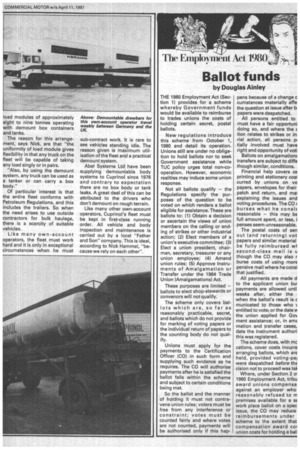The Employment Act . 1980":
Page 45

If you've noticed an error in this article please click here to report it so we can fix it.
Ballot funds
by Douglas Ainley
THE 1980 Employment Act (Section 1) provides for a scheme whereby Government funds would be available to reimburse to trades unions the costs of holding certain secret, postal ballots.
New regulations introduce this scheme from October 1, 1980 and detail its operation. Unions still are under no obligation to hold ballots nor to seek Government assistance while TUC policy urges total non-cooperation. However, economic realities may induce some union response.
Not all ballots qualify — the Regulations specify the purposes of the question to be voted on which renders a ballot eligible for assistance. These are ballots to: (1) Obtain a decision or ascertain the views of union members on the calling or ending of strikes or other industrial action; (2) Elect members of a union's executive committee; (3) Elect a union president, chairman, secretary, treasurer or any union employee; (4) Amend union rules; (5) Approve Instruments of Amalgamation or Transfer under the 1964 Trade Union (Amalgamations) Act.
These purposes are limited — ballots to elect shop-stewards or convenors will not qualify.
The scheme only covers ballots which are, so far as reasonably practicable, secret, and ballots which do not provide for marking of voting papers or the individual return of papers to the counting body do not qualify.
Unions must apply for the payments to the Certification Officer (CO) in such form and supplying such evidence as he requires. The CO will authorise payments after he is satisfied the ballot falls within the scheme and subject to certain conditions being met.
So the ballot and the manner of holding it must not contravene union rules; voters must be free from any interference or constraint; votes must be counted fairly and where votes are not counted, payments will be authorised only if this hap
■■■■■■■■■■•■•
pens because of a change c cumstances materially affe the question at issue after b. papers were despatched.
All persons entitled to must have a fair opportuni doing so, and where the ( tion relates to strikes or in rial action, all persons pi tially involved must have right and opportunity of voti Ballots on amalgamation; transfers are subject to diffe though similar, conditions.
Financial help covers cc printing and stationery cosi curred by unions on ye papers, envelopes for their patch and return, and mai explaining the issues and voting procedures. The CO r burses what he consi( reasonable — this may be full amount spent, or less, i penses seem unreasonable.
The postal costs of sen out (and returning) vot papers and similar material be fully reimbursed wl second-class mail is u though the CO may also r burse costs of using more pensive mail where he consi that justified.
All payments are made d to the applicant union bul payments are allowed unti weeks after, either the when the ballot's result is c municated to those who entitled to vote; or the date vi the union applied for Gov ment assistance; or, in am; mation and transfer cases, date the instrument authori this was registered.
The scheme does, with mc cations, cover costs incurre arranging ballots, which are held, provided voting-pal were despatched before the cision not to proceed was tal■
Where, under Section 2 cr 1980 Employment Act, tribu award unions compensa against an employer who reasonably refused to m premises available for a SE work place ballot on a spec issue, the CO may reduce reimbursements under scheme to the extent that compensation award co) union costs for holding a ball




































































































